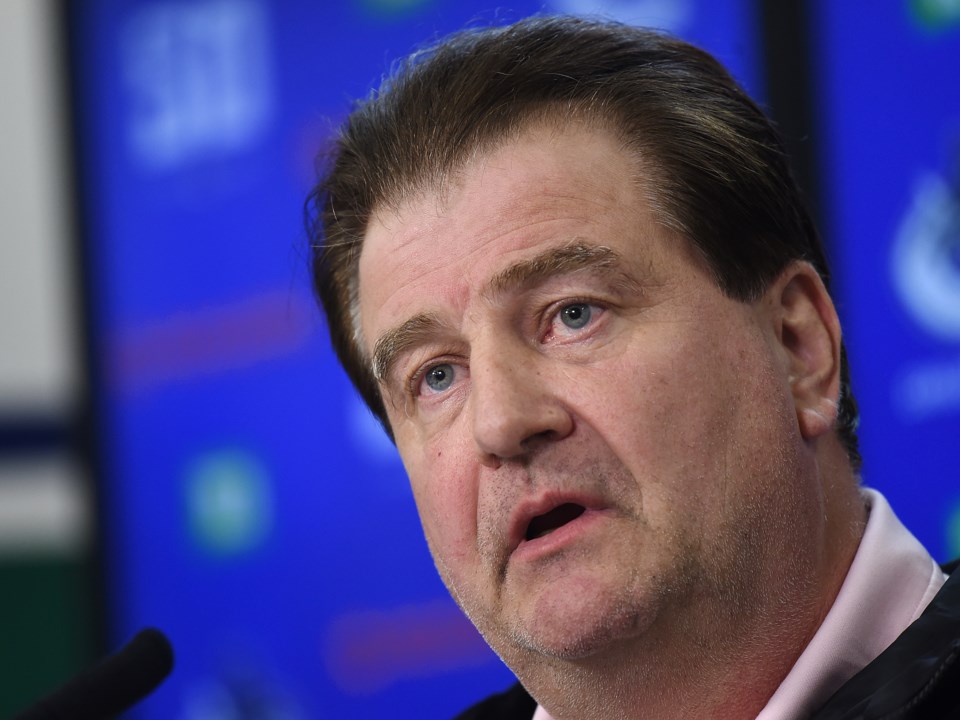As Canucks fans are well aware, Peter Chiarelli and Jim Benning won the Stanley Cup together in 2011 with the Boston Bruins. Chiarelli was the general manager and Benning was his right-hand man, one that the rest of the NHL saw as having paid his dues to become a general manager himself.
Sure enough, when the Vancouver Canucks needed a new general manager after firing Mike Gillis in 2014, they turned to Benning, whose experience as a scout and running drafts on his resume was hoped to be an antidote to the team’s lack of success at the draft.
A year later, after the Bruins missed the playoffs for the first time in eight years, Chiarelli was out of Boston too, but didn’t need to wait long to find a new job. The Edmonton Oilers snapped him up to not only be their new general manager, but also their President of Hockey Operations.
Surely the experienced GM with a Stanley Cup ring could take a core that featured Taylor Hall, Jordan Eberle, Ryan Nugent-Hopkins, and Leon Draisaitl back to the playoffs. And oh yeah, he had the first overall pick in the 2015 draft and added Connor McDavid. What could possibly go wrong?
Everything. Every damn thing.
Disastrous moves and false hope
Some of Chiarelli’s biggest moves backfired significantly. He traded Taylor Hall one-for-one for Adam Larsson in hopes of finding a number one defenceman. Hall went on to win a Hart Trophy with the New Jersey Devils, while Larsson has had a marginal impact on the Oilers blue line.
Another attempt to find a young defenceman was nearly as bad. Chiarelli traded his first and second round picks for Griffin Reinhart, who played a grand total of 30 games for the Oilers. That first-round pick turned into Mathew Barzal, the Islanders’ franchise forward.
Those are just two of Chiarelli’s disastrous moves, but two years into his tenure as Oilers GM, things weren’t looking that bad. The Oilers finished second in the Pacific Division, making the playoffs for the first time in eleven years. They made it to the second round and were a game away from the Western Conference Final, losing in Game 7.
Is this starting to sound familiar?
The Oilers believed they were a team on the rise, poised to become a powerhouse in short order. Instead, the next season they crashed and burned, not even coming close to the playoffs.
Sound familiar yet?
There are a few reasons why the Oilers collapsed after finally getting back to the playoffs. They moved on from players that had made them successful, like Jordan Eberle and Andrej Sekera. They didn’t recognize how an excellent season from goaltender Cam Talbot had masked some of their problems. And they had some big contracts on the books that made it difficult to maneuver around the salary cap to solve some of their problems.
Yeah, that sounds familiar all right.
Bad contracts and uncomfortable parallels
The Canucks are starting to look an awful lot like the 2017-18 Oilers, when they failed to follow up a strong playoff performance and missed the postseason entirely. It seems like Benning is once again following in the footsteps of his mentor, Chiarelli.
While Chiarelli had a head start with the young talent available to him when he joined the Oilers, Benning eventually caught up when several awful seasons gave him a few top 10 picks. Elias Pettersson and Quinn Hughes may not be McDavid and Draisaitl, but there’s certainly a parallel to be drawn.
Chiarelli failed to build quality depth around his young stars and particularly struggled to build a capable defence corps, which has similarly been a struggle for Benning. One of the major issues, of course, is the lack of cap flexibility caused by some ugly contracts.
In 2016, Chiarelli signed Milan Lucic to a dreadful seven-year contract worth $6 million per year. Shortly after, Benning followed suit, signing Loui Eriksson to a six-year deal worth $6 million per year. That’s not the only bad contract signed by the two GMs, but those are certainly the signature deals that have defined their tenure.
“When I look at the Canucks and the Oilers, one of the things that strikes me as similar and, if you're a Canucks fan, you hope I'm wrong about this, but they have a lot of bad contracts baked into the mix that are going to get worse as years go by,” said Jonathan Willis when I talked to him about what happened to the Oilers.
“When I look at Vancouver, I see Antoine Roussel, I see Jay Beagle, I see Loui Eriksson and Brandon Sutter,” he added. “Edmonton didn't have the ability to solve problems when it ran into them because they didn't have any discretionary money, because so much money was tied up in bad contracts. I look at Vancouver and I wonder if they're not looking at potentially having the same outcome.”
Like the Oilers, the Canucks lost some players in the offseason that were key to making the playoffs. Their goaltending advantage disappeared, albeit for different reasons — the Oilers simply overplayed Talbot, who wasn’t able to match his previous performance, while the Canucks saw Jacob Markstrom walk in free agency.
Chiarelli couldn’t find enough quality wingers to play with his stars; Benning let Tyler Toffoli walk in free agency.
There’s one error Benning didn’t copy from Chiarelli, but from the Oilers previous GM, Craig MacTavish, who signed expensive bottom-six veterans like Benoit Pouliot and Andrew Ference. While Chiarelli did acquire some expensive bottom-six forwards, like Mark Letestu and Lauri Korpikoski, they weren’t as expensive as Roussel or Beagle.
While the parallels are not perfect, it’s hard to ignore the end result. Benning’s Canucks have landed in the same spot as Chiarelli’s Oilers did a few years ago — wasting the final year of their franchise forward’s entry-level contract.




